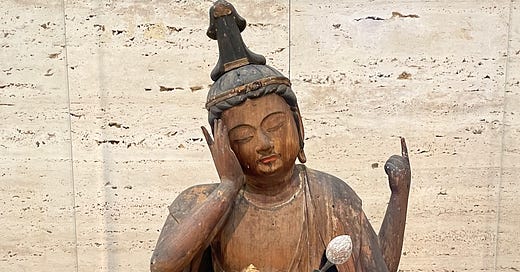
Readings
(click the header to view the readings)
Isaiah 42:1-12
Ephesians 6:10-20
John 3:16-21
Reflection
Buddhism has a beautiful view of the true nature of love, which is the mental state that is comprised of the four immeasurable minds:
compassion, which is the desire to relieve others of their suffering
loving-kindness, or the desire to help others to be happy
joy, which is the ability to experience all that is wondrous and refreshing in our lives
equanimity, which ensures that our love is not bound by attachment, discrimination, prejudice, or clinging
We looked at joy in detail last week, and in the final three days of Advent, I’ll give a short reflection on each of the other three immeasurable minds.
The word compassion comes from the Latin compassio, which contains “with” (com) and “to suffer” (passio), so it means “to suffer with” another person. When we have compassion, we recognize the suffering of others, and we seek to participate in it in such a way that we may be helpful in diminishing or eliminating it.
For example, suppose a dear friend has received a serious medical diagnosis that requires a challenging course of treatment. Our ability to accompany them on the difficulty road that lies ahead of them is likely to cause us to encounter difficult situations and painful feelings. Yet by doing this, we also receive the blessing of a deeper friendship, and our friend receives the gift of not having to manage their challenges alone. Our compassion, which is our willingness to suffer with our friend, is a bond that strengthens the love between us.
The bodhisattva of compassion (a Buddhist archetype) is Avalokiteshvara. Thich Nhat Hanh teaches us that she practices “looking with the eyes of compassion and listening deeply to the cries of the world.”1 Thus, the practices for cultivating compassion concern learning to look and listen deeply in the presence of suffering. Our aim is to be able to do this without falling into fear, anger, or despair.
Because participation in the suffering of others can be challenging, Nhat Hanh recommends that we study and develop a practice of mindful breathing in order to stabilize our minds.2 With that basis established, we can proceed to develop skills in deep looking and listening. See the day 20 entry on sharing joy for practices for deep listening.
When practice helps us to develop stable minds and the ability to look and listen deeply, we no longer need to turn away from suffering. And this practice of not turning away, of going into the heart of where pain and need reside, is central to authentic Christianity.
It starts with Christmas, when Jesus is born in order to participate fully in our world of pain and suffering. Again and again in the gospels we hear that he did this, going to where people were in misery to offer them wholeness and healing. Many verses refer to the compassion he felt for people, for their confusion, and for their mental and physical infirmities. Finally, his compassion led to the Cross, to his death, and to the new birth of the resurrected Body of Christ, of which we are the members. This wonderful truth inspires us to act as he did, bringing compassion and healing to wherever it is needed.
Prayer
Compassionate Christ, grant me the diligence to practice and stabilize my mind, so that when I encounter the fire of suffering, I need not turn away, but find that I have the courage and character to douse it with your abundant dew of compassion. Amen.
Thich Nhat Hanh, The Heart of the Buddha’s Teaching, Chapter 22: The Four Immeasurable Minds.
A great resource for this is Thich Nhat Hanh’s commentary on the Anapansati Sutta (Sutra on the Full Awareness of Breathing) called Breathe! You Are Alive.



